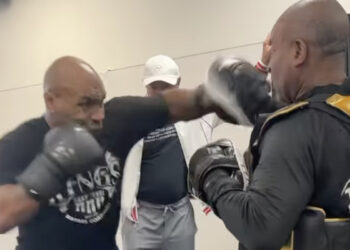In the plush neighborhood of Southwest Ranches, Florida, a dramatic episode unfolded that would ripple through the spheres of sports, music, and social media, spotlighting the complex interplay between celebrity privacy, neighborly conduct, and the pervasive eye of the internet. At the heart of this saga were Tyreek Hill, the electrifying All-Pro receiver for the Miami Dolphins, and Rick Ross, the famed rapper and entrepreneur, whose actions during a crisis would ignite a controversy as fierce as the fire itself.
As 2024 dawned, Tyreek Hill’s focus was on the upcoming NFL playoffs, a critical juncture in his professional career. However, days before the Miami Dolphins’ playoff aspirations were snuffed out, a more immediate and personal calamity struck. Hill’s residence in Southwest Ranches, a haven some 23 miles west of Fort Lauderdale, was engulfed in flames. The fire, sparked accidentally by a child playing with a lighter, rapidly spread through the mansion, threatening to consume everything in its path. Davie Fire Rescue teams responded with haste, managing to contain the blaze before it could wreak unfathomable havoc.
Among the onlookers was neighbor Rick Ross, who, rather than offering a hand or words of support, chose to document the unfolding disaster live on Instagram. With remarks like “Lil bro gonna have to build a new crib, it’s all good tho,” Ross’s livestream drew ire for its perceived insensitivity and for trivializing Hill’s plight.
The aftermath of the fire saw Tyreek Hill grappling not only with the physical damage to his home but also with a sense of betrayal by a neighbor he thought he could count on. Hill aired his grievances on the “Pivot Podcast,” expressing disillusionment with Ross’s choice to broadcast the incident rather than extending support. “First off, I just wanna say, Rick Ross, bro, I can’t vibe with you now, bro,” Hill lamented, marking a clear rift between the two.
Ross, for his part, sought to clarify his actions, stating on Instagram that his intentions were not to belittle or pick on Hill, whom he still referred to as his “homie.” Despite this, the gesture felt lacking, overshadowed by the prior act of broadcasting a personal crisis for public consumption.
The incident and ensuing fallout between Hill and Ross raise poignant questions about the expectations placed on celebrities in their private lives, the boundaries of neighborly etiquette, and the impact of social media on how personal crises are perceived and publicized. While Ross’s livestream brought the incident to the fore, it also underscored a pervasive voyeurism that social media facilitates, often at the expense of empathy and discretion.
Moreover, the episode highlighted the dichotomy between material loss and personal trauma. Ross’s comments on rebuilding, underscored by his own prosperity, hinted at a disconnect from the emotional and psychological toll such an incident inflicts, a sentiment echoed in Hill’s reaction and the public’s divided response.
The Tyreek Hill-Rick Ross saga encapsulates more than just a dispute between neighbors; it’s a reflection on the values we espouse in times of crisis, the role of community, and the pervasive influence of technology in mediating our relationships and responses to adversity. As the dust settles, one can only hope that lessons are learned about empathy, support, and the power of a simple, genuine offer of help over the impersonal gaze of a camera lens.
In the end, this story is not merely about the fire that ravaged a home but about the sparks of conflict ignited in its wake, serving as a cautionary tale on the complexities of modern celebrity culture and the ever-watchful eye of social media. As both Hill and Ross move forward, perhaps the most significant rebuild required is not of a home but of trust, understanding, and a sense of community that transcends the boundaries of fame and public persona.







